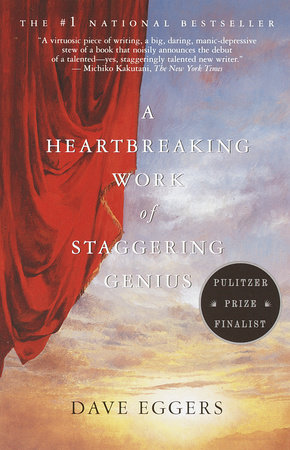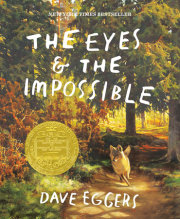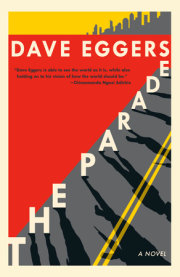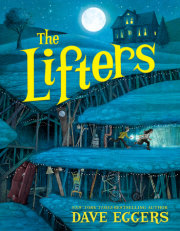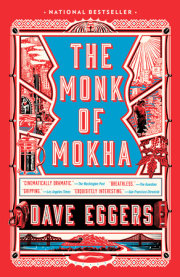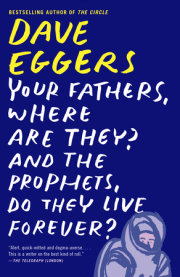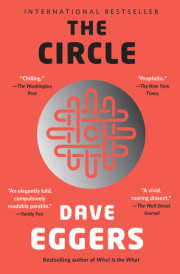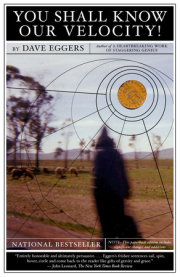OneThrough the small tall bathroom window the December yard is gray and scratchy, the trees calligraphic. Exhaust from the dryer billows clumsily out from the house and up, breaking apart while tumbling into the white sky.
The house is a factory.
I put my pants back on and go back to my mother. I walk down the hall, past the laundry room, and into the family room. I close the door behind me, muffling the rumbling of the small shoes in the dryer, Toph's.
"Where were you?" my mother says.
"In the bathroom," I say.
"Hmph," she says.
"What?"
"For fifteen minutes?"
"It wasn't that long."
"It was longer. Was something broken?"
"No."
"Did you fall in?"
"No."
"Were you playing with yourself?"
"I was cutting my hair."
"You were contemplating your navel."
"Right. Whatever."
"Did you clean up?"
"Yeah."
I had not cleaned up, had actually left hair everywhere, twisted brown doodles drawn in the sink, but knew that my mother would not find out. She could not get up to check.
My mother is on the couch. At this point, she does not move from the couch. There was a time, until a few months ago, when she was still up and about, walking and driving, running errands. After that there was a period when she spent most of her time in her chair, the one next to the couch, occasionally doing things, going out, whatnot. Finally she moved to the couch, but even then, for a while at least, while spending most of her time on the couch, every night at 11 p.m. or so, she had made a point of making her way up the stairs, in her bare feet, still tanned brown in November, slow and careful on the green carpet, to my sister's old bedroom. She had been sleeping there for years--the room was pink, and clean, and the bed had a canopy, and long ago she resolved that she could no longer sleep with my father's coughing.
But the last time she went upstairs was weeks ago. Now she is on the couch, not moving from the couch, reclining on the couch during the day and sleeping there at night, in her nightgown, with the TV on until dawn, a comforter over her, toe to neck. People know.
While reclining on the couch most of the day and night, on her back, my mom turns her head to watch television and turns it back to spit up green fluid into a plastic receptacle. The plastic receptacle is new. For many weeks she had been spitting the green fluid into a towel, not the same towel, but a rotation of towels, one of which she would keep on her chest. But the towel on her chest, my sister Beth and I found after a short while, was not such a good place to spit the green fluid, because, as it turned out, the green fluid smelled awful, much more pungent an aroma than one might expect. (One expects some sort of odor, sure, but
this.)And so the green fluid could not be left there, festering and then petrifying on the terry-cloth towels. (Because the green fluid hardened to a crust on the terry-cloth towels, they were almost impossible to clean. So the green-fluid towels were one-use only, and even if you used every corner of the towels, folding and turning, turning and folding, they would only last a few days each, and the supply was running short, even after we plundered the bathrooms, closets, the garage.) So finally Beth procured, and our mother began to spit the green fluid into, a small plastic container which looked makeshift, like a piece of an air-conditioning unit, but had been provided by the hospital and was as far as we knew designed for people who do a lot of spitting up of green fluid. It's a molded plastic receptacle, cream-colored, in the shape of a half-moon, which can be kept handy and spit into. It can be cupped around the mouth of a reclining person, just under the chin, in a way that allows the depositor of green bodily fluids to either raise one's head to spit directly into it, or to simply let the fluid dribble down, over his or her chin, and then into the receptacle waiting below. It was a great find, the half-moon plastic receptacle.
"That thing is handy, huh?" I ask my mother, walking past her, toward the kitchen.
"Yeah, it's the cat's meow," she says.
I get a popsicle from the refrigerator and come back to the family room.
They took my mother's stomach out about six months ago. At that point, there wasn't a lot left to remove--they had already taken out [I would use the medical terms here if I knew them] the rest of it about a year before. Then they tied the [something] to the [something], hoped that they had removed the offending portion, and set her on a schedule of chemotherapy. But of course they didn't get it all. They had left some of it and it had grown, it had come back, it had laid eggs, was stowed away, was stuck to the side of the spaceship. She had seemed good for a while, had done the chemo, had gotten the wigs, and then her hair had grown back--darker, more brittle. But six months later she began to have pain again--
Was it indigestion? It could just be indigestion, of course, the burping and the pain, the leaning over the kitchen table at dinner; people have indigestion; people take Tums;
Hey Mom, should I get some Tums?--but when she went in again, and they had "opened her up"--a phrase they used--and had looked inside, it was staring out at them, at the doctors, like a thousand writhing worms under a rock, swarming, shimmering, wet and oily--
Good God!--or maybe not like worms but like a million little podules, each a tiny city of cancer, each with an unruly, sprawling, environmentally careless citizenry with no zoning laws whatsoever. When the doctor opened her up, and there was suddenly light thrown upon the world of cancer-podules, they were annoyed by the disturbance, and defiant.
Turn off. The fucking. Light. They glared at the doctor, each podule, though a city into itself, having one single eye, one blind evil eye in the middle, which stared imperiously, as only a blind eye can do, out at the doctor.
Go. The. Fuck. Away.The doctors did what they could, took the whole stomach out, connected what was left, this part to that, and sewed her back up, leaving the city as is, the colonists to their manifest destiny, their fossil fuels, their strip malls and suburban sprawl, and replaced the stomach with a tube and a portable external IV bag. It's kind of cute, the IV bag. She used to carry it with her, in a gray backpack--it's futuristic-looking, like a synthetic ice pack crossed with those liquid food pouches engineered for space travel. We have a name for it. We call it "the bag."
My mother and I are watching TV. It's the show where young amateur athletes with day jobs in marketing and engineering compete in sports of strength and agility against male and female bodybuilders. The bodybuilders are mostly blond and are impeccably tanned. They look great. They have names that sound fast and indomitable, names like American cars and electronics, like Firestar and Mercury and Zenith. It is a great show.
"What is this?" she asks, leaning toward the TV. Her eyes, once small, sharp, intimidating, are now dull, yellow, droopy, strained--the spitting gives them a look of constant exasperation.
"The fighting show thing," I say.
"Hmm," she says, then turns, lifts her head to spit.
"Is it still bleeding?" I ask, sucking on my popsicle.
"Yeah."
We are having a nosebleed. While I was in the bathroom, she was holding the nose, but she can't hold it tight enough, so now I relieve her, pinching her nostrils with my free hand. Her skin is oily, smooth.
"Hold it tighter," she says.
"Okay," I say, and hold it tighter. Her skin is hot.
Toph's shoes continue to rumble.
A month ago Beth was awake early; she cannot remember why. She walked down the stairs, shushing the green carpet, down to the foyer's black slate floor. The front door was open, with only the screen door closed. It was fall, and cold, and so with two hands she closed the large wooden door, click, and turned toward the kitchen. She walked down the hall and into the kitchen, frost spiderwebbed on the corners of its sliding glass door, frost on the bare trees in the backyard. She opened the refrigerator and looked inside. Milk, fruit, IV bags dated for proper use. She closed the refrigerator. She walked from the kitchen into the family room, where the curtains surrounding the large front window were open, and the light outside was white. The window was a bright silver screen, lit from behind. She squinted until her eyes adjusted. As her eyes focused, in the middle of the screen, at the end of the driveway, was my father, kneeling.
It's not that our family has no taste, it's just that our family's taste is inconsistent. The wallpaper in the downstairs bathroom, though it came with the house, is the house's most telling decorative statement, featuring a pattern of fifteen or so slogans and expressions popular at the time of its installation.
Right On, Neat-O, Outta Sight!--arranged so they unite and abut in intriguing combinations.
That-A-Way meets
Way Out so that the A in
That-A-Way creates
A Way Out.The words are hand-rendered in stylized block letters, red and black against white. It could not be uglier, and yet the wallpaper is a novelty that visitors appreciate, evidence of a family with no pressing interest in addressing obvious problems of decor, and also proof of a happy time, an exuberant, fanciful time in American history that spawned exuberant and fanciful wallpaper.
The living room is kind of classy, actually--clean, neat, full of heirlooms and antiques, an oriental rug covering the center of the hardwood floor. But the family room, the only room where any of us has ever spent any time, has always been, for better or for worse, the ultimate reflection of our true inclinations. It's always been jumbled, the furniture competing, with clenched teeth and sharp elbows, for the honor of the Most Wrong-looking Object. For twelve years, the dominant chairs were blood orange. The couch of our youth, that which interacted with the orange chairs and white shag carpet, was plaid--green, brown and white. The family room has always had the look of a ship's cabin, wood paneled, with six heavy wooden beams holding, or pretending to hold, the ceiling above. The family room is dark and, save for a general sort of decaying of its furniture and walls, has not changed much in the twenty years we've lived here. The furniture is overwhelmingly brown and squat, like the furniture of a family of bears. There is our latest couch, my father's, long and covered with something like tan-colored velour, and there is the chair next to the couch, which five years ago replaced the bloodoranges, a sofa-chair of brownish plaid, my mother's. In front of the couch is a coffee table made from a cross section of a tree, cut in such a way that the bark is still there, albeit heavily lacquered. We brought it back, many years ago, from California and it, like most of the house's furniture, is evidence of an empathetic sort of decorating philosophy--for aesthetically disenfranchised furnishings we are like the families that adopt troubled children and refugees from around the world--we see beauty within and cannot say no.
One wall of the family room was and is dominated by a brick fireplace. The fireplace has a small recessed area that was built to facilitate indoor barbecuing, though we never put it to use, chiefly because when we moved in, we were told that raccoons lived somewhere high in the chimney. So for many years the recessed area sat dormant, until the day, about four years ago, that our father, possessed by the same odd sort of inspiration that had led him for many years to decorate the lamp next to the couch with rubber spiders and snakes, put a fish tank inside. The fish tank, its size chosen by a wild guess, ended up fitting perfectly.
"Hey
hey!" he had said when he installed it, sliding it right in, with no more than a centimeter of give on either side. "Hey
hey!" was something he said, and to our ears it sounded a little too Fonzie, coming as it did from a gray-haired lawyer wearing madras pants. "Hey
hey!" he would say after such miracles, which were dizzying in their quantity and wonderment--in addition to the Miracle of the Fish-tank Fitting, there was, for example, the Miracle of Getting the TV Wired Through the Stereo for True Stereo Sound, not to mention the Miracle of Running the Nintendo Wires
Under the Wall-to-Wall Carpet So as Not to Have the Baby Tripping Over Them All the Time Goddammit. (He was addicted to Nintendo.) To bring attention to each marvel, he would stand before whoever happened to be in the room and, while grinning wildly, grip his hands together in triumph, over one shoulder and then the other, like the Cub Scout who won the Pinewood Derby. Sometimes, for modesty's sake, he would do it with his eyes closed and his head tilted.
Did I
do that?
"Loser," we would say.
"Aw, screw you," he would say, and go make himself a Bloody Mary.
The ceiling in one corner of the living room is stained in concentric circles of yellow and brown, a souvenir from heavy rains the spring before. The door to the foyer hangs by one of its three hinges. The carpet, off-white wall-to-wall, is worn to its core and has not been vacuumed in months. The screen windows are still up--my father tried to take them down but could not this year. The family room's front window faces east, and because the house sits beneath a number of large elms, it receives little light. The light in the family room is not significantly different in the day and the night. The family room is usually dark.
I am home from college for Christmas break. Our older brother, Bill, just went back to D.C., where he works for the Heritage Foundation--something to do with eastern European economics, privatization, conversion. My sister is home because she has been home all year--she deferred law school to be here for the fun. When I come home, Beth goes out.
"Where are you going?" I usually say.
"Out," she usually says.
I am holding the nose. As the nose bleeds and we try to stop it, we watch TV. On the TV an accountant from Denver is trying to climb up a wall before a bodybuilder named Striker catches him and pulls him off the wall. The other segments of the show can be tense--there is an obstacle course segment, where the contestants are racing against each other and also the clock, and another segment where they hit each other with sponge-ended paddles, both of which can be extremely exciting, especially if the contest is a close one, evenly matched and with much at stake--but this part, with the wall climbing, is too disturbing. The idea of the accountant being chased while climbing a wall...no one wants to be chased while climbing a wall, chased by anything, by people, hands grabbing at their ankles as they reach for the bell at the top. Striker wants to grab and pull the accountant down--he lunges every so often at the accountant's legs--all he needs is a good grip, a lunge and a grip and a good yank--and if Striker and his hands do that before the accountant gets to ring the bell...it's a horrible part of the show. The accountant climbs quickly, feverishly, nailing foothold after foothold, and for a second it looks like he'll make it, because Striker is so far below, two people-lengths easily, but then the accountant pauses. He cannot see his next move. The next grip is too far to reach from where he is. So then he actually
backs up, goes down a notch to set out on a different path and when he steps down it is unbearable, the suspense. The accountant steps down and then starts up the left side of the wall, but suddenly Striker is there, out of nowhere--
he wasn't even in the screen!--and he has the accountant's leg, at the calf, and he yanks and it's over. The accountant flies from the wall (attached by rope of course) and descends slowly to the floor. It's terrible. I won't watch this show again.
Mom prefers the show where three young women sit on a pastel-colored couch and recount blind dates that they have all enjoyed or suffered through with the same man. For months, Beth and Mom have watched the show, every night. Sometimes the show's participants have had sex with one another, but use funny words to describe it. And there is the funny host with the big nose and the black curly hair. He is a funny man, and has fun with the show, keeps everything buoyant. At the end the show, the bachelor picks one of the three with whom he wants to go on another date. The host then does something pretty incredible: even though he's already paid for the three dates previously described, and even though he has nothing to gain from doing anything more,
he still gives the bachelor and bachelorette money for their next date.Mom watches it every night; it's the only thing she can watch without falling asleep, which she does a lot, dozing on and off during the day. But she does not sleep at night.
"Of course you sleep at night," I say.
"I don't," she says.
"Everyone sleeps at night," I say--this is an issue with me--"even if it doesn't feel like it. The night is way, way too long to stay awake the whole way through. I mean, there have been times when I was pretty sure I had stayed up all night, like when I was sure the vampires from
Salem's Lot--do you remember that one, with David Soul and everything? With the people impaled on the antlers? I was afraid to sleep, so I would stay up all night, watching that little portable TV on my stomach, the whole night, afraid to drift off, because I was sure they'd be waiting for just that moment, just when I fell asleep, to come and float up to my window, or down the hall, and bite me, all slow-like. . ."
She spits into her half-moon and looks at me.
"What the hell are you talking about?"
In the fireplace, the fish tank is still there, but the fish, four or five of those bug-eyed goldfish with elephantiasis, died weeks ago. The water, still lit from above by the purplish aquarium light, is gray with mold and fish feces, hazy like a shaken snow globe. I am wondering about something. I am wondering what the water would taste like. Like a nutritional shake? Like sewage? I think of asking my mother:
What do you think that would taste like? But she will not find the question amusing. She will not answer.
"Would you check it?" she says, referring to her nose.
I let go of her nostrils. Nothing.
I watch the nose. She is still tan from the summer. Her skin is smooth, brown. Then it comes, the blood, first in a tiny rivulet, followed by a thick eel, venturing out, slowly. I get a towel and dab it away.
"It's still coming," I say.
Her white blood cell count has been low. Her blood cannot clot properly, the doctor had said the last time this had happened, so, he said, we can have no bleeding. Any bleeding could be the end, he said. Yes, we said. We were not worried. There seemed to be precious few opportunities to draw blood, with her living, as she did, on the couch.
I'll keep sharp objects out of proximity, I had joked to the doctor. The doctor did not chuckle. I wondered if he had heard me. I considered repeating it, but then figured that he had probably heard me but had not found it funny. But maybe he didn't hear me. I thought briefly, then, about supplementing the joke somehow, pushing it over the top, so to speak, with the second joke bringing the first one up and creating a sort of one-two punch.
No more knife fights, I might say.
No more knife throwing, I might say, heh heh. But this doctor does not joke much. Some of the nurses do. It is our job to joke with the doctors and nurses. It is our job to listen to the doctors, and after listening to the doctors, Beth usually asks the doctors specific questions--
How often will she have to take that? Can't we just add that to the mix in the IV?--and then we sometimes add some levity with a witty aside. From books and television I knowto do this. One should joke in the face of adversity; there is always humor, we are told. But in the last few weeks, we haven't found much. We have been looking for funny things, but have found very little.
"I can't get the game to work," says Toph, who has appeared from the basement. Christmas was a week ago, and we got him a bunch of new games for the Sega.
"What?"
"I can't get the game to work."
"Is it turned on?"
"Yes."
"Is the cartridge plugged all the way in?"
"Yes."
"Turn it off and on again."
"Okay," he says, and goes back downstairs.
Through the family room window, in the middle of the white-silver screen, my father was in his suit, a gray suit, dressed for work. Beth paused in the entrance between the kitchen and the family room and watched. The trees in the yard across the street were huge, gray-trunked, high-limbed, the short grass on the lawn yellowed, spotted with fall leaves. He did not move. His suit, even with him kneeling, leaning forward, was loose on his shoulders and back. He had lost so much weight. A car went by, a gray blur. She waited for him to get up.
You should see the area where her stomach was. It's grown like a pumpkin. Round, bloated. It's odd--they removed the stomach, and some of the surrounding area if I remember correctly, but even with the removal of so much thereabouts, she looks pregnant. You can see it, the bulge, even under the blanket. I'm assuming it's the cancer, but I haven't asked my mother, or Beth. Was it the bloating of the starving child? I don't know. I don't ask questions. Before, when I said that I asked questions, I lied.
The nose has at this point been bleeding for about ten minutes. She had had one nosebleed before, two weeks ago maybe, and Beth could not make it stop, so she and Beth had gone to the emergency room. The hospital people had kept her for two days. Her oncologist, who sometimes we liked and sometimes we did not, came and visited and glanced at stainless steel charts and chatted on the side of the bed--he has been her oncologist for many years. They gave her new blood and had monitored her white blood cell count. They had wanted to keep her longer, but she had insisted on going home; she was terrified of being in there, was finished with hospitals, did not want--
She had come out feeling defeated, stripped, and now, safely at home, she did not want to go back. She had made me and Beth promise that she would never have to go back. We had promised.
"Okay," we said.
"I'm serious," she said.
"Okay," we said.
I push her forehead as far back as possible. The arm of the couch is soft and pliable.
She spits. She is used to the spitting, but still makes strained, soft vomiting noises.
"Does it hurt?" I ask.
"Does what hurt?"
"The spitting."
"No, it feels good, stupid."
"Sorry."
A family walks by outside, two parents, a small child in snowpants and a parka, a stroller. They do not look through our window. It is hard to tell if they know. They might know but are being polite. People know.
My mother likes to have the curtains open so she can see the yard and the street. During the day it is often very bright outside, and though the brightness is visible from inside the family room, somehow the light does not travel effectively into the family room, in terms of bringing to the family room any noticeable illumination. I am not a proponent of the curtains being open.
Some people know. Of course they know.
People know.
Everyone knows.
Everyone is talking. Waiting.
I have plans for them, the nosy, the inquisitive, the pitying, have developed elaborate fantasies for those who would see us as grotesque, pathetic, our situation gossip fodder. I picture strangulations--Tsk tsk, I hear she's- GURGLE!--neck-breakings--what will happen to that poor little bo-CRACK!--I picture kicking bodies as they lie curled on the ground, spitting blood as they--Jesus Christ, Jesus fucking Christ, I'm sorry, I'm sorry!--beg for mercy. I lift them over my head and then bring them down, break them over my knee, their spines like dowels of balsa. Can't you see it? I push offenders into giant vats of acid and watch them struggle, scream as the acid burns, breaks them apart. My hands fly into them, breaking their skin--I pull out hearts and intestines and toss them aside. I do head-crushings, beheadings, some work with baseball bats--the variety and degree of punishment depending on the offender and the offense. Those whom I don't like or my mother doesn't like in the first place get the worst--usually long, drawn-out strangulations, faces of red then purple then mauve. Those I barely know, like the family that just walked by, are spared the worst--nothing personal. I'll run them over with my car.
We are both distantly worried about the bleeding nose, my mother and I, but are for the time being working under the assumption that the nose will stop bleeding. While I hold her nose she holds the half-moon receptacle as it rests on the upper portion of her chest, under her chin.
Just then I have a great idea. I try to get her to talk funny, the way people talk when their nose is being held.
"Please?" I say.
"No," she says.
"C'mon."
"Cut it out."
"What?"
Copyright © 2000 by Dave Eggers. All rights reserved. No part of this excerpt may be reproduced or reprinted without permission in writing from the publisher.

